Hajar Press
Hajar Press
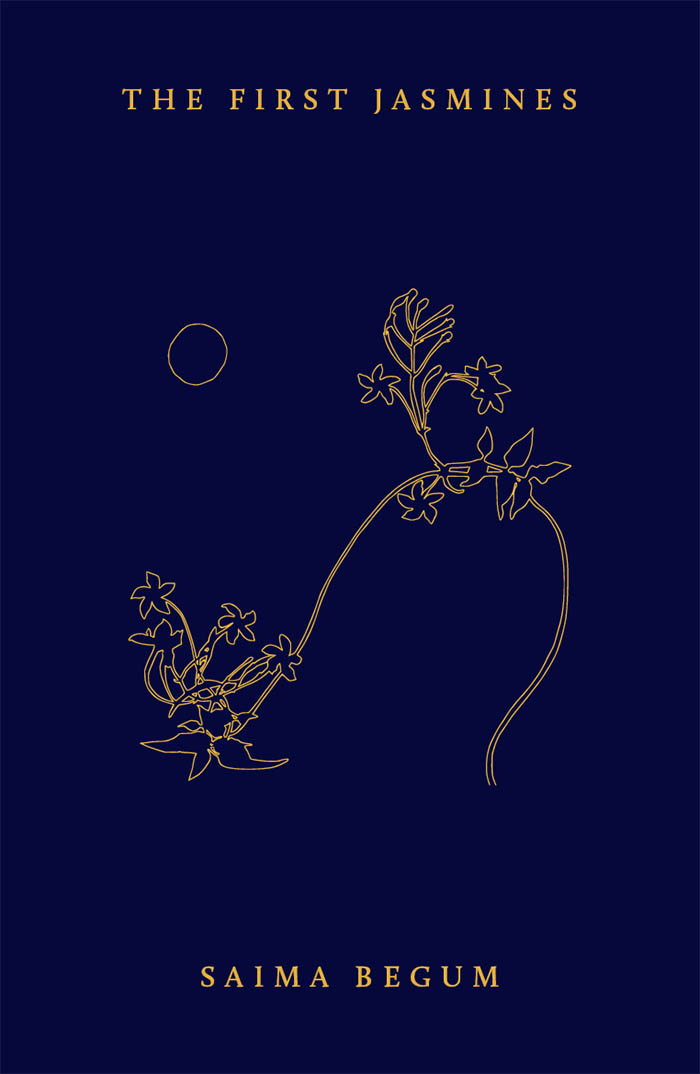
The First Jasmines
East Pakistan, 1971. On their way to visit their mother, two sisters, Lucky and Jamila, are captured by Pakistani soldiers and thrown into a world of horror.
Locked in a room in an unknown village-turned-camp by the river, the women look through a lone barred window onto white jasmines blooming day and night. Meanwhile, around the camp, deadly guerrilla fighters from the Bengali Mukti Bahini gather to take back territory from the Pakistan Army.
As Bangladesh crowns painfully into the world, Lucky and Jamila must choose between heartbreak and secrecy to return from an unspoken violence.
Saima Begum is a British-Bangladeshi writer based in North London. She won the MFest Short Story Competition in 2021. The First Jasmines is her first novel.
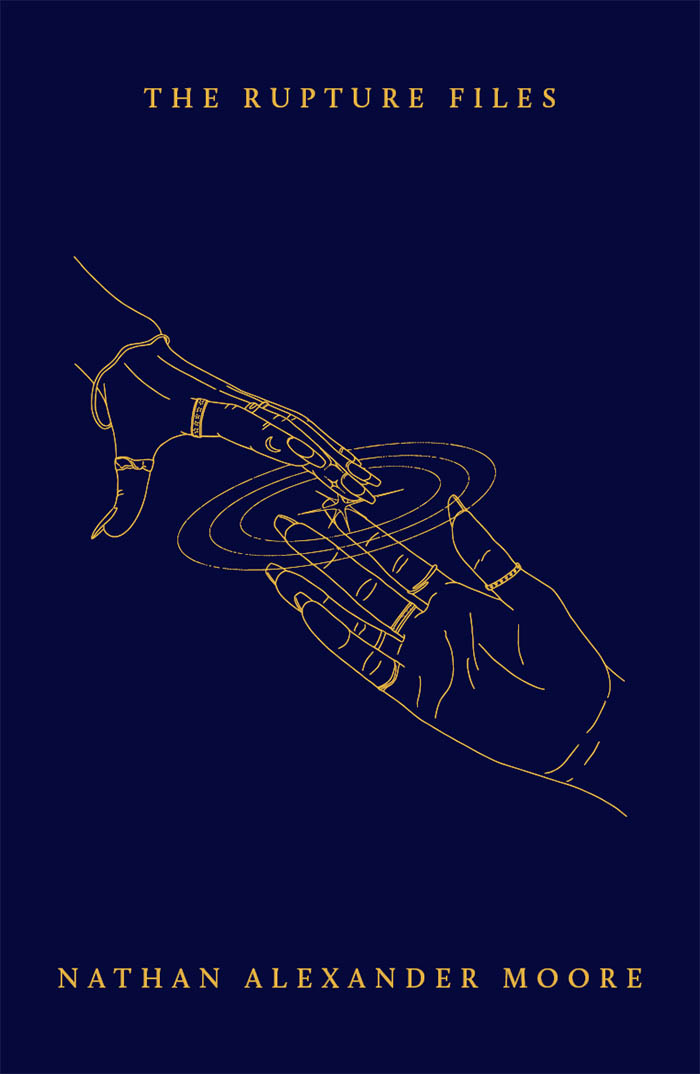
The Rupture Files
Across multiple worlds in upheaval, a curious cast of Black queer characters must choose between what they already know themselves to be and what they might yet become in the cataclysm. A shapeshifter learns to embrace their body as it changes through a lunar cycle. A stranger’s visit disturbs three sisters sheltering from monsters that stalk the land. An archivist hears an irresistible call to the rising ocean as she uncovers a surprising history. A mysterious fire sparks whispers of revolution in the mind of a vampire’s captive consort.
At once tender and audacious, Nathan Alexander Moore’s debut collection tells the stories of extraordinary creatures making impossible but human decisions. Traversing apocalypses both big and small, these captivating tales vibrate with the tensions between loss and growth; self and community; precarity and possibility.
Nathan Alexander Moore is a Black transfemme writer. She is an assistant professor at the University of Colorado Boulder whose research explores Black transfemininity, speculative fictions and temporality. Their debut chapbook, small colossus, was published in 2021, and their fiction was shortlisted for the 2022 Santa Fe Writers Project Literary Award. She was a 2023 Lambda Literary Fellow in poetry.

You Must Believe in Spring
Twenty years after she first chanted in Tahrir, Hanan’s son is living under military rule in Egypt. Though he is both a disciple of the national Sufi institute and a swimmer representing the Armed Forces, proximity to power cannot undo his revolutionary birthright: like his mother and grandmother before him, Shahed is an undercover rebel.
When a general arrives at the Sufi institute looking for help with a military assignment, Shahed accepts, all while concealing his own plans for resistance. The mission takes him behind the walls of a prison town, inside a secret army barracks in the Sinai desert, and deep into the murky waters of the past.
As he wades through his mother’s repressed memories and the state’s repressed histories, Shahed grapples with the traumas of the revolution and the weight of authoritarian rule, searching for new ways to revolt for freedom.
Mohamed Tonsy is a queer Egyptian writer and ceramicist. Formerly an architect and a triathlete representing the Egyptian Triathlon Federation, he completed a PhD in Creative Writing at the University of Edinburgh. His writing has appeared in Mizna and Epoch Press and was shortlisted in MFest’s 2021 Short Story Competition. You Must Believe in Spring is his first book.

We, the Heartbroken
What do we do when the world breaks our hearts? Racial capitalism in the age of pandemic continues to crush ever more lives and spirits. Yet, we are told repeatedly to master, to overcome, to be resilient. Beneath this fragile pretence of coping, many of us have grown used to living with profound and fathomless sorrow.
In graceful prose, Gargi Bhattacharyya navigates collective grief and how it mingles with personal tragedy. Alongside love and joy, perhaps grief is what makes us human―and while its pain scrapes our wounds, its presence can help us renounce that which exists and build anew.
Heartbreak is the class consciousness of our times. So, it is up to us, the heartbroken, to learn again to heal—and remake the world.
"We, the Heartbroken reckons with loss and grief’s fullness and its surprising abilities to make us alive to one another … entranced by one another again. We are called upon to do this work, to allow for heartbreak to engender capaciousness and collectivity."
— Full Stop
Gargi Bhattacharyya lives and works in London. Their work includes writing on racism, racial capitalism, austerity and war.
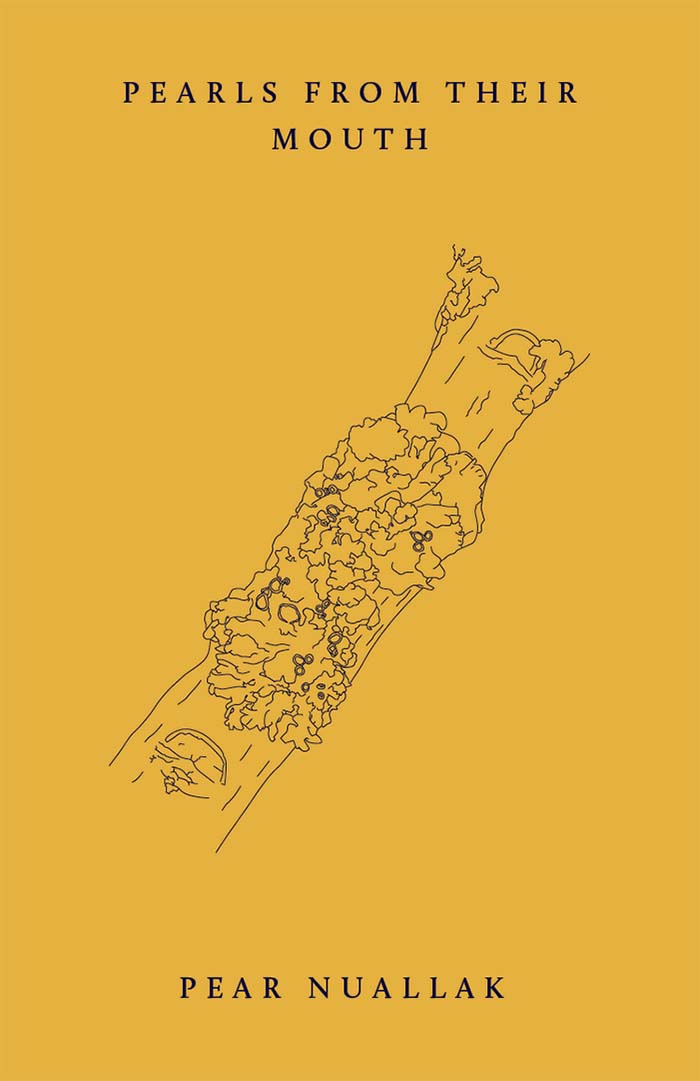
Pearls from Their Mouth
This book is built of stories and provocations—like the birth of a pearl, it transforms that which irritates, layer by layer.
Through speculative fiction and critical essays, Pear Nuallak explores what happens when messy, desiring bodies collide with the hard edge of power. The world’s neat categories are unmade and rewritten, revealing that racial capitalism’s myths are just as much fantasies as Thai bird princesses and transgender magic.
Moving playfully across folktale, horror, satire and critique, Nuallak examines how different beings are formed politically, bodily and emotionally. We discover interdimensional fungi resisting colonisation, queer monsters living on Hampstead Heath, and a mysterious canal running through the ruins of capitalism into interstitial realms. We test the borders of queer diasporic nationalism and take apart the racially melancholic memoir. In this fiery yet delicate collection, we aren’t bound by truth, but flow with it into new worlds.
Pear Nuallak is a visual artist and writer from London. They run community art workshops and co-organise a queer social hub with the Black Cap Community Benefit Society. Their writing has been published in The Dark and Interfictions. Pearls from Their Mouth is their first book.
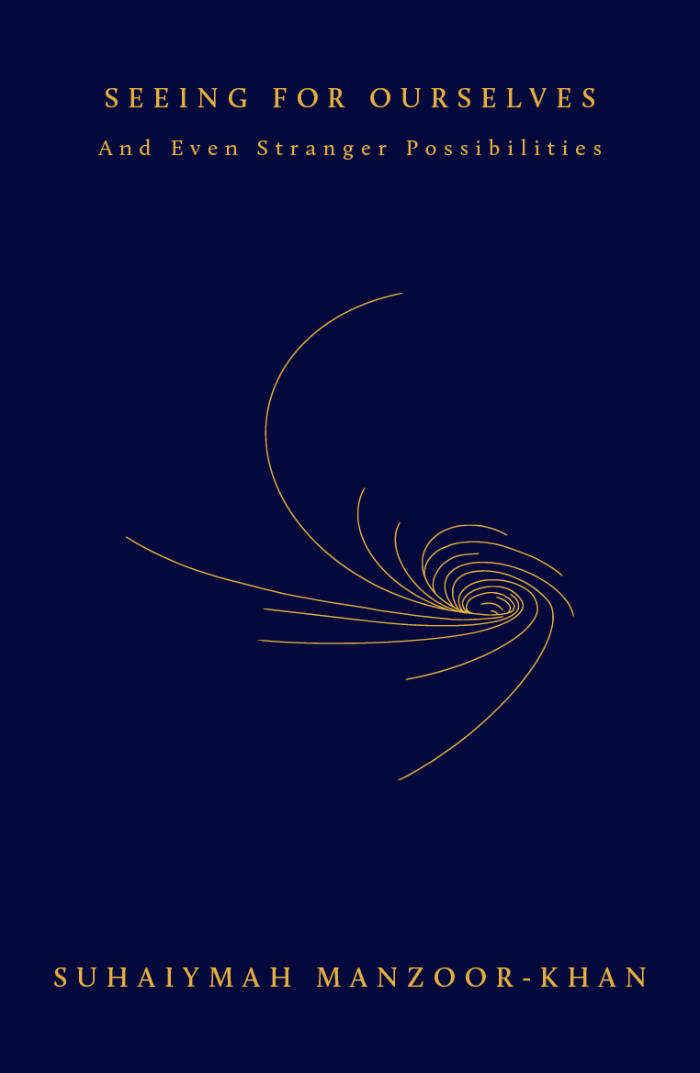
Seeing for Ourselves
Why do we yearn to be seen when we are already far too visible? How do we want to be perceived, and how are we exposed? Could we ever really see for ourselves?
In memoir, vignettes, poetry and essays, Suhaiymah Manzoor-Khan records her observations from the stands at the dizzying circus of being seen and unseen. She surveys the criminalising stadium of civic life, the open-air arenas of family, friendship and grief, the performative pageantry of the public eye and the unclad secrets of the self in solitude, paying attention to what’s on show and what goes undetected.
Perhaps the strangest, most exciting possibilities are opened when we surrender to another kind of sight. Submitting to the gaze of the Unseen and the All-Seeing, Manzoor-Khan invites us to close our eyes and discover what it would mean to look with our souls instead.
Suhaiymah Manzoor-Khan is a poet and writer whose work disrupts assumptions about history, race, violence and knowledge. She is the author of Tangled in Terror and the poetry collection Postcolonial Banter; a co-author of A FLY Girl’s Guide to University; and a contributor to the anthologies Cut from the Same Cloth? and I Refuse to Condemn. She is based in Leeds and is currently writing for theatre.

Sambac Beneath Unlikely Skies
Tender yet brutal vignettes on a girlhood in Gaza, Palestine, filled with honey and warmth.
Winner of the Creative Award in the 2022 Palestine Book Awards.
Chosen as a 2021 Book of the Year by The White Review, Middle East Eye & The New Arab.
Sambac Beneath Unlikely Skies is written for those who had to leave—collected remembrances of a childhood in Gaza by a woman far from Palestine’s sun and sea. Overindulgent, chaotic and sentimental, Heba Hayek’s narrator struggles to navigate life in colder, unfamiliar worlds. She holds tightly to memories of home, hoping they will lead back to her sisters and mothers.
With brilliance and grace, Hayek’s vignettes explore the methods of survival nurtured by Palestinian women in the face of colonial occupation and patriarchy—the power of community care, and of loving what’s not meant to be loved. Her reflections reveal the intimate magnificence and quiet devastation of everyday life: a family drive on the shore, waxing for the first time with aunties, or peeling figs while waiting at a checkpoint.
Heba Hayek is a London-based, Gaza-raised Palestinian author, creative and facilitator. She completed an MFA in Creative Writing at Miami University, Ohio, and studied for an MA in Social Anthropology at SOAS University of London.
Heba’s first book, Sambac Beneath Unlikely Skies, won the Creative Award in the 2022 Palestine Book Awards and was chosen as a 2021 Book of the Year by The White Review, Middle East Eye and The New Arab.
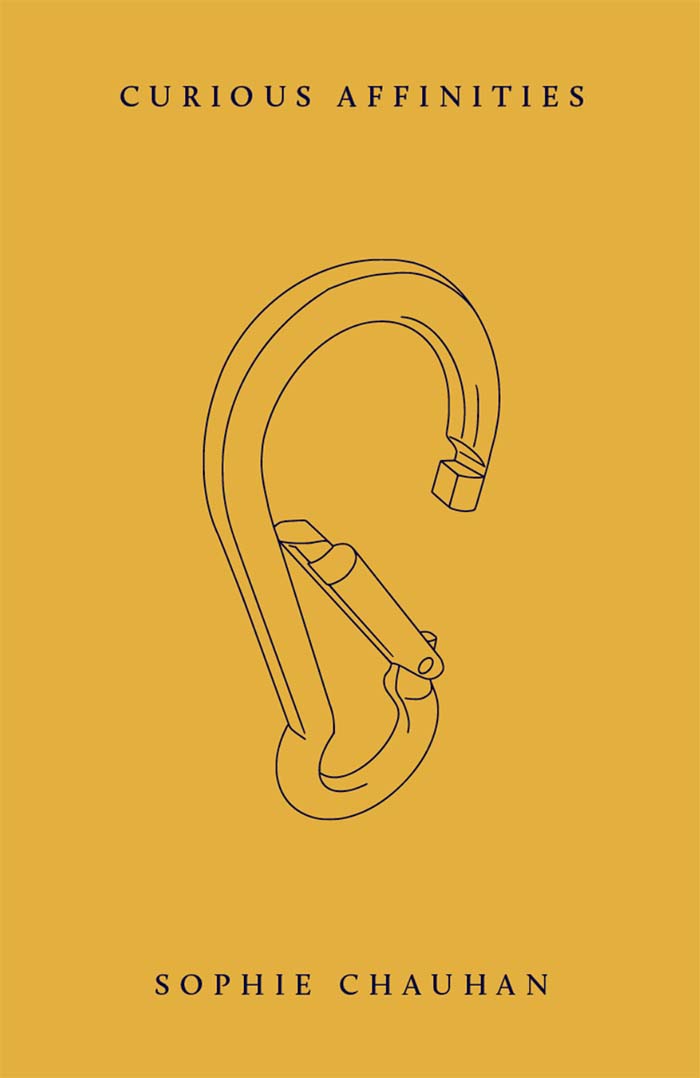
Curious Affinities
How much distance and difference can intimacy hold? How much proximity and likeness does it require? What can we learn from its capacities? And what could we salvage from its limits?
Curious Affinities unravels the risks and possibilities brought forth by unconventional styles of intimacy. Across kinship, friendship, romance and community, the threads of social relation are entangled by race, class and queerness in unexpected and generative ways, as we find ourselves rent to shreds and stitched back together in the name of common feelings.
In rousing poetry and incisive prose, Sophie Chauhan reflects on the bonds and boundaries that govern our collective ways of life and wonders how they might be reimagined.
Sophie Chauhan is a London-based writer and researcher, born in the UK and raised in Naarm (Melbourne). She is completing a PhD in Race, Ethnicity and Postcolonial Studies at University College London. Her academic, creative and organising work converge around her interest in anti-capitalist, queer and decolonial approaches to radical coalition-building.
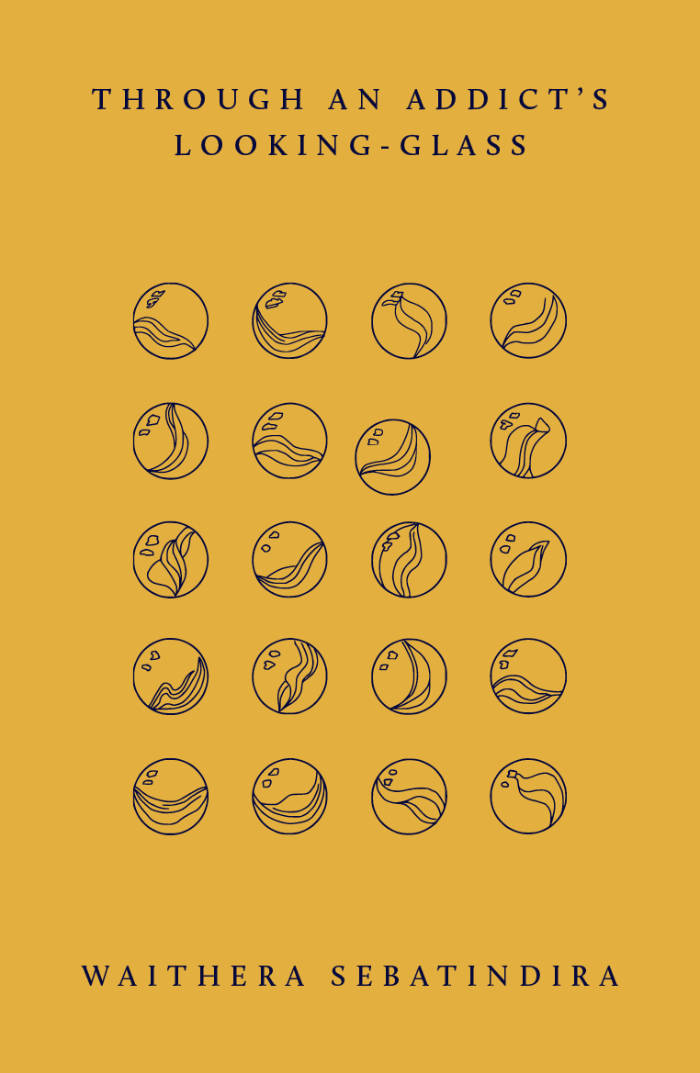
Through an Addict’s Looking-Glass
Through an Addict’s Looking-Glass is an exercise in meaning-making, a thinking-out-loud. Waithera Sebatindira unravels how it feels to live as an addict under capitalism, pondering how engaging with these experiences could bring the horizon of liberation towards us.
Through embodied explorations of addiction and recovery, Sebatindira invites us to inhabit crip time, a concept that describes different temporal realities in the lives of disabled people. In this collection, the addict’s crip time is distorted, mutable and non-linear, hopping backwards and forwards through memory loops and memory loss. Blackout is time travel; sobriety is failure; finitude, freedom.
An uncompromising rejection of the objectification of addicts across the political spectrum, this powerful meditation on illness, disability, solidarity and spirituality illuminates their indispensable contributions to the building of a new world.
Waithera Sebatindira is a Kenyan writer based in London. Their previous writing and research interests have included food imperialism, drag kings and gender transformation. They are a co-author of A FLY Girl’s Guide to University.

The Stone House
A vivid, haunting tale of intergenerational trauma and survival under Israeli occupation.
A New Arab Book of the Year 2021.
The year is 1968. The recent Arab defeat in the Naksa has led to the loss of all of historic Palestine. In the midst of violent political upheaval, Mahmoud, a young Palestinian boy living in the Galilee, embarks on a school trip to visit the West Bank for the first time.
For Mahmoud, his mother and his grandmother, the journey sets off a flood of memories, tracing moments that bond three generations together. How do these personal experiences become collective history? Why do some feel guilty for surviving war? Is it strange to long for a time never lived?
In this groundbreaking novella, Yara Hawari harnesses the enduring power of memory in defiance of the constrictions on Palestinian life. Against a system bent on the erasure of their people, the family’s perseverance is unbroken in the decades-long struggle for their stone house.
Yara Hawari is a Palestinian writer and political commentator. She completed her PhD in Middle East Politics at the University of Exeter, where her research focused on oral history and Indigenous Studies. She currently works as a senior analyst at Al-Shabaka, a Palestinian think tank. The Stone House is her first book.

Brick by Brick: How We Build a World Without Prisons
The fight for prison abolition is a struggle for collective liberation: a transformative vision of a safer world, in which communities live free from exploitation on a thriving planet.
Drawing connections across social justice movements with a shared abolitionist ethic, this revolutionary book illuminates how harmful ideas of criminality and punishment can manifest in many ways beyond the prison industrial complex. This work is a collaboration with friends, mentors and giants fighting for housing justice, food justice, climate justice, migrant justice, justice for survivors of violence, and more.
With this insightful and generous book, now in its second edition, Cradle Community invites us to explore what it will take to dismantle structures of oppression, and to imagine the future we can rebuild together—brick by brick.
Cradle Community is a collective of organisers committed to radical education and building understanding of prison abolition and transformative justice. Brick by Brick is their first book.

Experiments in Imagining Otherwise
This is a book of failure and mistakes; it begins with what is stolen from us and proposes only an invitation to imagine.
In these playful written experiments, Lola Olufemi navigates the space between what is and what could be. Weaving together fragmentary reflections in prose and poetry, this is an exploration of the possibility of living differently, grounded in black feminist scholarship and political organising.
Olufemi shows that the horizon is not an immaterial state we gesture toward. Instead, propelled by the motion of thinking against and beyond, we must invent the future now and never let go of the otherwise.
Lola Olufemi is a black feminist writer and CREAM/Stuart Hall Foundation researcher from London. Her work focuses on the uses of the feminist imagination and its relationship to futurity, political demands and imaginative-revolutionary potential. She is the author of Experiments in Imagining Otherwise and Feminism, Interrupted: Disrupting Power, the co-author of A FLY Girl’s Guide to University, and a member of ‘bare minimum’, an interdisciplinary anti-work arts collective.